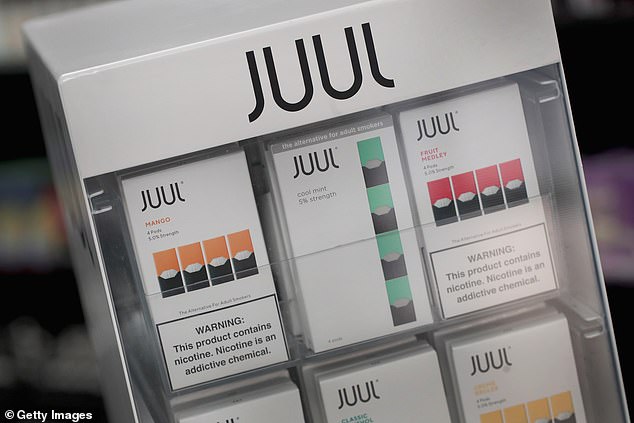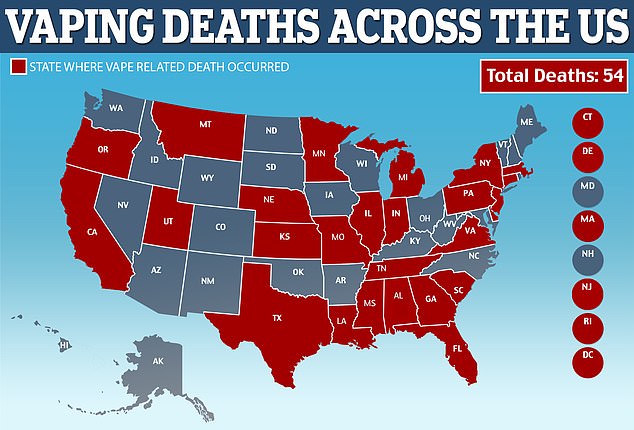Juul pod flavors like creme brulee, menthol and mint blamed for getting teens hooked on vaping raise risks for lung injuries and cancer by damaging DNA, study suggests
- Sweet e-cigarette liquid flavors have been blamed for getting teenagers addicted to vaping
- But little is known about how the chemicals in these flavors may affect the lungs
- Juul has cornered 70 percent of the e-cigarette market and is the favorite brand of middle and high schoolers
- Researchers at the University of Rochester found that Juul’s seven flavors contain more than 40 different chemicals
- Human lung tissue samples exposed to these vapors showe signs of inflammation and DNA damage that can eventually lead to cancer
Vaping flavored Juul pods may raise the risks of lung disease and cancer by altering DNA, a new study suggests.
Researchers at Rochester University in New York broke down the individual chemicals that compose various companies’ e-cigarette liquids.
They found that chemicals in seven different Juul flavors triggered inflammation, broke down the cells that compose lung tissue in ways that could over time cause serious damage and illness.
They also found that the flavored e-liquids damage DNA – a warning sign of eventual cancer – and that Juul’s best-selling menthol flavor wreaked no less havoc than did its other sweeter flavors.

Juul’s sweet-flavored pods – including mango, berry medley and it’s blockbuster, mint, can trigger inflammation and DNA damage linked to lung disease and cancer, a new study found
Vaping is largely being treated as two separate but related crises in the US: life-threatening lung illnesses largely caused by vitamin E acetate in THC e-cigarettes and the ‘epidemic’ of US teenagers addicted to vaping.
Just as THC vapes are the primary suspect in the 2,500 lung illnesses, US officials have blamed sweet-flavored e-cigarette liquids lowering the barrier to entry to vaping for teenagers.
A recent Food and Drug Administration (FDA) study found that 72 percent of high school students and nearly 60 percent of middle school students who vape, but don’t smoke, use flavored e-cigarettes.
Mint and menthol flavors were among the most popular among the students.
And Juul, specifically, was cited as the most popular vaping brand among young people.
Even before the study’s findings, the FDA had warned the company that its sweet flavors and marketing campaigns were suspected of enticing underage users to try vaping.
States, cities, individuals, schools and groups have all sued Juul, blaming the company for getting teenagers hooked on its potent dose of nicotine – often specifically through its sweet flavored pods.
Very early research into and warnings bout vaping, when it was first gaining popularity, suggested that ingredients used to give e-cigarette liquids flavored might be carcinogenic.
But that line of investigation became overshadowed by the acute illnesses, hospitalizations and deaths from what’s now known as ‘EVALI.’

As of Friday, vaping had killed 54 people in 27 states (red) officials said. Another 2,506 Americans have been hospitalized after using e-cigarettes
New research brings flavored vapes back into the fore.
Researchers at the University of Rochester analyzed seven Juul flavors and broke them down into some 40 compounds.
Juul’s labeling only discloses that nicotine, vegetable glycerine and propylene – the common bases for e-cig liquids.
But the Rochester team found a number of other compounds, including substances called volatile organic compounds.
These are commonly found in industrial settings – and are among the reasons that workers on these sites wear protective masks.
In containers, researchers exposed samples of human lung tissue to vapor produced by heating the Juul liquids.
The vapor triggered inflammation and weakened cells that line the lungs and allow for them to take in oxygen as well as degrading immune cells.
DNA analysis of the cells showed that the genetic information had been damaged too – changes that can eventually lead to cancer.
These effects have the potential to eventually cause the kinds of acute harm that has left 52 e-cigarette users dead, as well as long-term problems from damage that accumulate’s over time.
‘While names like mango, cucumber, and mint give the impression that the flavors in e-juices are benign, the reality is that these sensations are derived from chemicals,’ said lead author Dr Irfan Rahman, a professor in the department of environmental medicine at the University of Rochester Medical Center.
‘Vaping technology has only existed for a short period of time and its use, particularly among younger people, has only recently exploded.
‘This study gives further evidence that vaping – while less harmful than combustible tobacco in the short run – is placing chronic users on the path to significant health problems later in life.’
